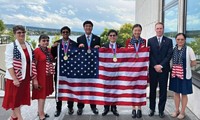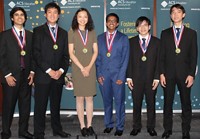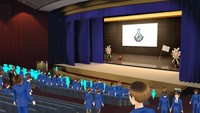Advertisement
Grab your lab coat. Let's get started
Welcome!
Welcome!
Create an account below to get 6 C&EN articles per month, receive newsletters and more - all free.
It seems this is your first time logging in online. Please enter the following information to continue.
As an ACS member you automatically get access to this site. All we need is few more details to create your reading experience.
Not you? Sign in with a different account.
Not you? Sign in with a different account.
ERROR 1
ERROR 1
ERROR 2
ERROR 2
ERROR 2
ERROR 2
ERROR 2
Password and Confirm password must match.
If you have an ACS member number, please enter it here so we can link this account to your membership. (optional)
ERROR 2
ACS values your privacy. By submitting your information, you are gaining access to C&EN and subscribing to our weekly newsletter. We use the information you provide to make your reading experience better, and we will never sell your data to third party members.
Physical Chemistry
China takes home the top 3 golds in 54th International Chemistry Olympiad
US wins 1 gold and 3 silver medals at the annual high school chemistry competition
by Nina Notman, special to C&EN
July 19, 2022

High school students from China earned the top three gold medals in the 54th International Chemistry Olympiad (IChO), which was hosted remotely from Tianjin July 10–18. The US team was awarded one gold and three silver medals.
Jack Liu, a graduate of Carmel High School in Indiana; Nathan Ouyang, from University High School in Irvine, California; Gideon Tzafriri, a graduate of Lexington High School in Massachusetts; and Phoenix Wu, from Seven Lakes High School in Texas, made up the US team.
More than 300 students from 84 countries took part in this year’s virtual IChO. Ouyang was placed 6th, earning him a gold medal, while Liu, Wu, and Tzafriri were placed 37th, 60th, and 94th, respectively, earning silver medals.
“We’re really proud of our team. They worked really hard. It was a tough exam and they came out with good results,” says the US team’s head mentor, Joseph Houck, an associate teaching professor at Penn State University.
The US team took the 5-hour theoretical exam, in front of a supervisor, at the American Chemical Society offices in Washington, DC, on Wednesday, July 13. The topics covered in the questions included rapid COVID-19 detection techniques, carbon dioxide capture and transformation, and lithium-sulfur batteries.
“A lot of the exam was focused on real-world problems, which I think made the test interesting,” says Liu. “I was a big fan of the kinetics-based question about catalysts that are used in cars to convert nitric oxides into less environmentally-harmful gases. I’m generally a big fan of physical chemistry,” adds Wu.
Organizers of IChO provided a chat room through which all participating teams could interact. The same online platform was used to host online chemistry lectures and virtual field trips to sites local to Tianjin such as Nankai University.
“For the virtual events, we had an online platform called ChemZone where you could meet other IChO participants. It was pretty fun,” says Ouyang.
The US team also visited sightseeing destinations around Washington, DC, including George Washington’s Mount Vernon, the National Air and Space Museum, and John F. Kennedy Center for the Performing Arts.
“The highlight of the week was spending time with my team from the US,” says Tzafriri. “For both the camp and the international olympiad, the majority of our time is not spent on doing tests; it is spent on growing better connections to others.”
In addition to Houck, mentors for the US team included Esther Hines of Billerica Memorial High School in Massachusetts and Laura Serbulea of the University of Virginia.
Liu and Tzafriri will both start college in the fall at the Massachusetts Institute of Technology and the University of Massachusetts Amherst, respectively. Ouyang will be a high school junior and Wu a high school senior.





Join the conversation
Contact the reporter
Submit a Letter to the Editor for publication
Engage with us on Twitter